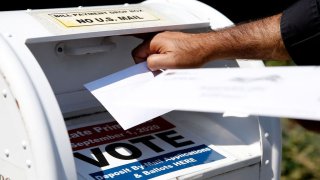
A question that would require Massachusetts voters to present an ID and a second that would grant new benefits for drivers for companies like Uber and Lyft while stopping short of declaring them employees have cleared an initial hurdle on their way to next year's ballot.
Other proposed initiatives that received a constitutional green light from Attorney General Maura Healey's office Wednesday would legalize the sale of fireworks in Massachusetts, create a "whale safe fishing act," allow for the return of "happy hours," and create a "Right to Counsel Program" for those facing eviction.
STAY IN THE KNOW
Watch NBC10 Boston news for free, 24/7, wherever you are. |
|
Get Boston local news, weather forecasts, lifestyle and entertainment stories to your inbox. Sign up for NBC Boston’s newsletters. |
The questions were among 16 proposed laws and one proposed constitutional amendment that met the requirements for ballot initiatives outlined in the Massachusetts Constitution, according to Healey's office. Another 13 proposed were deemed unconstitutional.
The Massachusetts Constitution requires proposed initiatives be in the proper form to present to voters, not be substantially the same as any measure on the ballot in either of the two preceding statewide elections, contain only subjects related to each other and not involve topics specifically excluded from the ballot initiative process.
Get top local stories in Boston delivered to you every morning. Sign up for NBC Boston's News Headlines newsletter.
One of the thorniest questions is the one being pushed by some gig workers and a coalition of app-based businesses including Uber, Lyft, DoorDash and Instacart.
Supporters say the proposal would set a minimum earnings guarantee for workers, extend new benefits including health care stipends, paid sick time and paid family and medical leave and occupational accident insurance, and protect drivers from discrimination. At the same time, workers would remain as independent contractors instead of employees.
Critics, including labor unions, said the measure would create a "second class" status for drivers, delivery workers, and other app-based workers in Massachusetts while allowing big tech companies to avoid paying taxes and pushing a false choice that drivers can only maintain scheduling flexibility by surrendering other worker rights.
Other questions allowed to move ahead Wednesday would ban hospital CEOs from working with medical device or pharmaceutical companies and increase the statewide limits on the combined number of licenses any one retailer can have for the sale of alcoholic beverages.
Another ballot question that passed the constitutional test is backed by the conservative Massachusetts Fiscal Alliance and would roll back the Transportation and Climate Initiative, a pact signed in 2020 by the governors of three New England states — Massachusetts, Connecticut and Rhode Island — and the mayor of Washington, D.C., aimed at reducing transportation pollution.
"The TCI ballot question would allow ordinary residents to decide if the state should artificially limit the supply of gasoline and diesel fuels in order to increase fuel costs with hopes to drive down usage," said Paul Diego Craney, a spokesman for the group.
The group Transportation for Massachusetts said the multi-state pact is aimed at reducing carbon emissions while generating investments in clean transportation alternatives. The ballot question would threaten efforts to address extreme weather events fueled by climate change and could damage other efforts to eliminate pollution from transportation, the group said.
Among the questions that failed the constitutional test according to Healey are proposals that would make it a felony to target an individual's ability to make a living due to postings on social media, ban smoking in multi-family housing units, and require that if a child is born alive, all reasonable steps must be taken to preserve the child's life.
Voters or petitioners who take issue with the AG's certification decisions can ask the Supreme Judicial Court for a review.
Passing the constitutional test is just the first step on a long journey to the 2022 ballot.
Supporters must now collect the signatures of more than 80,200 registered voters by Dec. 1. Once these signatures are collected, the proposal will be sent to state lawmakers. If the Legislature fails to enact their proposal before May 4, supporters have to collect an additional 13,300 signatures by July 6 to secure a place for the initiative on the November 2022 ballot.
The decisions do not reflect her office's support or opposition to the questions, Healey said.
A petition cannot be approved if it relates to religion, religious practices or religious institutions; the powers, creation or abolition of the courts; the appointment, compensation or tenure of judges; a specific appropriation of funds from the state treasury; or if it infringes on other protected constitutional rights, such as trial by jury, freedom of the press and freedom of speech, Healey's office said.

